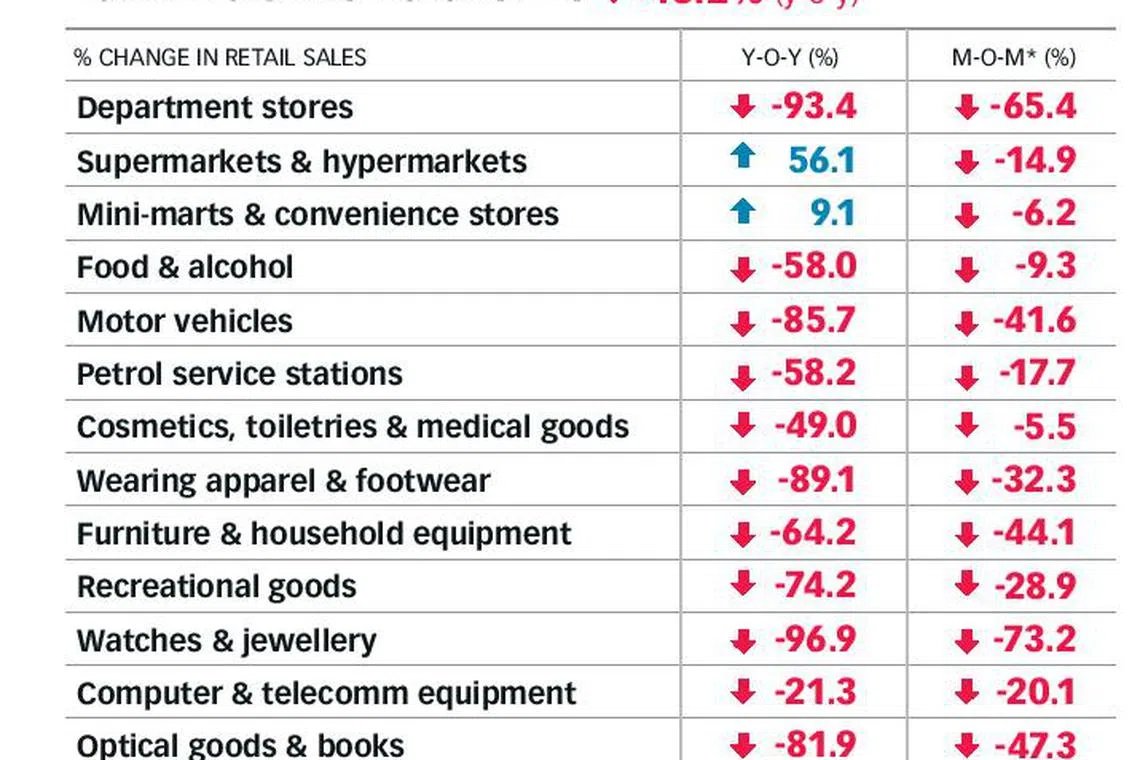May retail sales hit all-time low; industry hoping for rebound
Receipts plunge 52.1% - the worst since records began in 1986; supermarts, mini-marts, convenience stores buck trend

Singapore
SINGAPORE retailers crashed to an all-time low in May, as revenue was more than halved on the year before.
Receipts posted a ghastly plunge of 52.1 per cent - the worst since records began in 1986, the Department of Statistics (SingStat) said on Friday.
As stores warily reopen after a two-month quasi-lockdown, the hope is that the only direction left is up. Yet it's far too early to shout "ka-ching!", industry watchers warn, despite hopes of a "revenge buying" spree in June from pent-up demand.
Singapore shuttered all non-essential businesses and limited food and beverage (F&B) operators to delivery and takeaway services in April and May, in a "circuit breaker" meant to contain the deadly novel coronavirus.
But the public health move came at a steep cost for an industry that was already shrinking since last year.
Navigate Asia in
a new global order
Get the insights delivered to your inbox.

Even with big-ticket motor vehicle purchases excluded, May's fall in retail sales was 45.2 per cent. Supermarkets and hypermarkets, as well as mini-marts and convenience stores, were the only types of retailers to post revenue growth for the month.
All other segments saw double-digit decreases of as much as 96.9 per cent for watches and jewellery, 93.4 per cent for department stores, and 89.1 per cent for clothing and shoes. The turnover declines, which exceeded the 40.3 per cent drop in April, were "due to circuit-breaker measures in May", said SingStat.
Looking ahead, "the outlook for recovery remains bleak", a spokeswoman for the Singapore Retailers Association (SRA) told The Business Times. She cited factors such as safe-distancing measures in stores and shopping malls, "which will reduce the opportunity for sales conversion".
Private-sector economists are still pencilling in a year-on-year slump in full-year retail sales, and the SRA said it expects discretionary retail purchases to still drop by more than 50 per cent in the next six months.
While Singapore started its three-stage economic reopening on June 2, Maybank Kim Eng economist Lee Ju Ye noted that people are still not venturing out of their homes as much as they did before the pandemic struck.
However, she expects car sales to markedly improve when Certificate of Entitlement (COE) bidding resumes next week after a three-month halt.
But Ms Lee also told BT: "Sales in department stores and luxury goods... will likely stay weak in the near term, as borders stay closed to tourists and consumers stay cautious in a recessionary environment."
Till takings were worth S$1.8 billion in all in May, while 24.5 per cent of sales came from online transactions - up from 17.8 per cent in April.
OCBC Bank chief economist Selena Ling called online sales a silver lining, while Barnabas Gan, an economist at United Overseas Bank, said the e-commerce surge suggested encouraging and robust demand from consumers.
Yet the move to the Web barely stemmed the bloodshed, stores said.
"The revenue generated from online retail will never be able to replace the revenue generated from physical stores," said the SRA spokeswoman, noting that overheads still exist.
Key concerns repeatedly flagged by industry include the eventual ends of wage subsidies and rent moratoria that were in place in earlier months. A spokesperson for lobby group Singapore Tenants United For Fairness, which was set up this year to seek rental relief from landlords, added that "business was zero or close to zero" for most bricks-and-mortar businesses during the circuit breaker.
Online sales "came at the expense of high discounts for retailers or delivery service commissions for F&B operators", the spokesperson told BT.
Meanwhile, F&B services sales dropped by 50.1 per cent in May across all categories. Restaurants were the worst hit, with a 68.7 per cent sales drop, while fast food outlets eked out a 20.5 per cent decrease.
F&B receipts came up to S$430 million in all, while 44.6 per cent of sales were online, compared with 39.2 per cent in the month before.
A Restaurant Association of Singapore spokesperson told BT that "many brands have experienced huge drop in sales" of 40 per cent to 90 per cent, with recovery still sluggish as many consumers are working from home and cautious about dining out. She called on the authorities to consider relaxing safety restrictions, such as the five-person cap on diners, which would raise seating capacity.
Ms Ling said: "Given the significant uncertainties, even an initial June retail bounce may not be sufficient to compensate for the shortfall seen in the two months of cold storage."
Decoding Asia newsletter: your guide to navigating Asia in a new global order. Sign up here to get Decoding Asia newsletter. Delivered to your inbox. Free.
Copyright SPH Media. All rights reserved.
